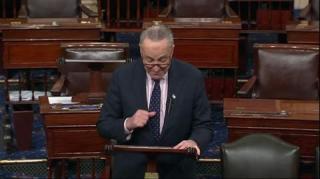Senate Minority Leader Charles E. Schumer took to the Senate floor Thursday morning to announce his widely expected opposition to Neil Gorsuch’s nomination to the U.S. Supreme Court -- and to say that Democrats will try to block his nomination.
“After careful deliberation, I have concluded that I cannot support Judge Neil Gorsuch’s nomination to the Supreme Court,” said Schumer, D-N.Y. “His nomination will have a cloture vote. He will have to earn 60 votes for confirmation. My vote will be no, and I urge my colleagues to do the same.”
By saying Gorsuch’s nomination will have a cloture vote, Schumer indicated that Democrats will try to block Gorsuch’s nomination through a filibuster -- which they can do unless Gorsuch can earn 60 votes from the 100-member Senate.
All 54 Republican senators are expected to support Gorsuch’s nomination, but it’s unknown whether he can get the support of enough Democrats and Democratic-leaning independents to clear the 60-vote hurdle.
Gorsuch needs six non-Republican votes in the Senate to join the Supreme Court. It is possible that he will win those votes from among a group of nine Democratic senators who face re-election next year in states that Republican Donald Trump won in last fall’s presidential election.
But one of those nine lawmakers -- Sen. Bob Casey, D-Pa. -- announced his opposition to Gorsuch Thursday morning.
And in a 20-minute speech on the Senate floor, Schumer laid out several reasons why he will urge his fellow Democrats to oppose President Trump’s first nominee to the Supreme Court.
“Judge Gorsuch was unable to sufficiently convince me that he’d be an independent check on a president who has shown almost no restraint from executive overreach,” Schumer said.
In addition, “he was unable to convince me he would be a mainstream justice who could rule free from the biases of politics and ideology,” Schumer said.
And lastly, Gorsuch “is someone who almost instinctively favors the powerful over the weak, corporations over Americans,” the senator said. “There could not be a worse time for those instincts.”
Schumer then detailed several court cases in which Gorsuch, currently a judge on the 10th Circuit U.S. Court of Appeals, sided in favor of the powerful over the vulnerable.
Gorsuch did himself no favors in his confirmation hearing before the Senate Judiciary Committee earlier this week, Schumer added.
“He declined to answer question after question with any substance,” Schumer said
Noting that both President Barack Obama’s high court nominees, and those of President George W. Bush, were able to clear the 60-vote threshold, Schumer warned Senate Republican leaders against changing Senate rules to allow Gorsuch’s nomination to be confirmed with a simple majority.
“I say if this nominee cannot reach 60 votes...the answer isn’t to change the rules. It’s to change the nominee,” Schumer said.
Trump nominated Gorsuch to fill the seat of the late Justice Antonin Scalia, who died more than a year ago.
Obama had nominated Merrick Garland, another appeals court judge, to fill Scalia’s seat, but Senate Majority Leader Mitch McConnell refused to consider Garland’s nomination, saying the new president had the right to nominate Scalia’s successor.

